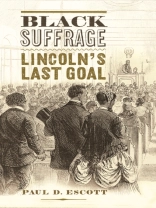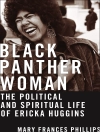In April 1865, as the Civil War came to a close, Abraham Lincoln announced his support for voting rights for at least some of the newly freed enslaved people. Esteemed historian Paul Escott takes this milestone as an opportunity to explore popular sentiment in the North on this issue and, at the same time, to examine the vigorous efforts of Black leaders, in both North and South, to organize, demand, and work for their equal rights as citizens.
As Escott reveals, there was in the spring of 1865 substantial and surprisingly general support for Black suffrage, most notably through the Republican Party, which had succeeded in linking the suffrage issue to the securing of the Union victory. This would be met with opposition, however, from Lincoln’s successor, Andrew Johnson, and, just as important, from a Democratic Party—including Northern Democrats—that had failed during the course of the war to shed its racism. The momentum for Black suffrage would be further threatened by conflicts within the Republican Party over the issue.
Based on extensive research into Republican and Democratic newspapers, magazines, speeches, and addresses, Escott’s latest book illuminates the vigorous national debates in the pivotal year of 1865 over extending the franchise to all previously enslaved men—crucial debates that have not yet been examined in full—revealing both the nature and significance of growing support for Black suffrage and the depth of white racism that was its greatest obstacle.
Mục lục
Preface
Introduction: Lincoln’s Last Goal
1. Shock, Grief, Disorientation
2. Hopeful Signs
3. Democratic Opposition
4. Johnson Announces His Policy on Reconstruction
5. Republicans Advocate for Black Suffrage
6. Black and White Abolitionists Advocate
7. Northern Democrats Attack
8. Republicans Seek a Path Forward
9. Toward Elections
10. Elections Settle Two Questions
11. An Ambiguous and Deceptive Executive
12. Toward the Return of Congress
13. Congress Reconvenes—The Effort Continues
Epilogue: Patterns in the Civil War Era
Notes
Selected Bibliography
Index
Giới thiệu về tác giả
Paul D. Escott is Reynolds Professor of History Emeritus at Wake Forest University and author of Slavery Remembered: A Record of Twentieth-Century Slave Narratives, winner of the Mayflower Cup, and The Worst Passions of Human Nature: White Supremacy in the Civil War North (Virginia).










